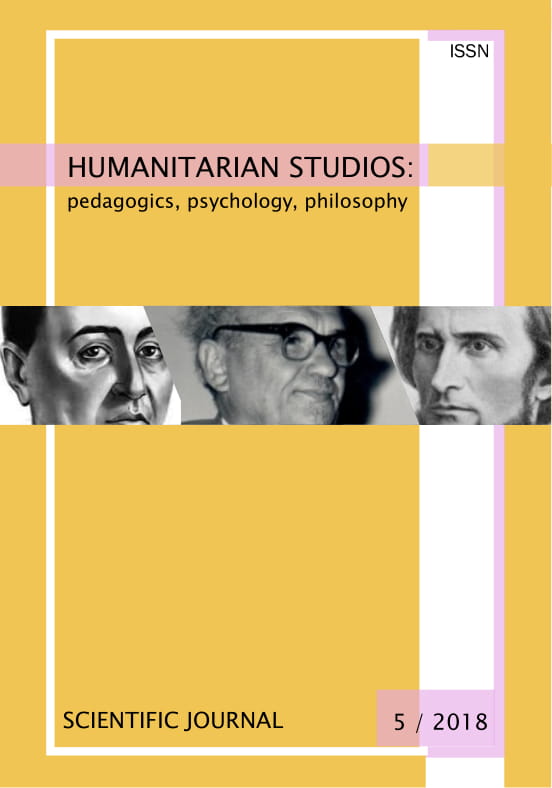Development tendencies of universities in the conditions Global challenges and threats of the XXI century
DOI:
https://doi.org/10.31548/hspedagog2019.02.034Abstract
Currently, the disclosure of trends in the development of universities in the context of global challenges and threats of the 21-st century is relevant, to due to the fact that globalization has significantly increased the impact on the transformation of national systems of higher education. A complex of methods was used: analysis, synthesis, generalization, comparison. It was founded the finance system of universities needs to be improved, taking into account the differences between universities; the conditions of entry to higher education and the modernization of education in the forward-looking basis, taking into account the demographic situation and trends in the development of national and world economy, the labor market needs. It was proposed to create a system of attracting pedagogues to work at advanced enterprises, educational and research centers, which will give the opportunity to keep up; to recognize as one of the priority tasks the support of a pedagogues, scientist, graduated student, the creation of conditions for their successful activity, the development of talents as an important factor in improving the quality of the education system of Ukraine. In order implementation of the principle of «lifelong learning» are reviewed the traditional forms and methods of organization of education. Prospects for further research are seen in the disclosure of ways to implement proposals.References
Balabanova N. (2005). Suspilstvo znan ta innovatsii: shliakh do maibutnoho Ukrainy [Society of knowledge and innovations: The Way to the Future of Ukraine]. Kiev, Ukrain-ian : Aristei, 104.
Delanty D. Novye modely unyversytetov [The new models of uni-versities]. URL: // http://socio.tamp.RU/1.htm. Russian.
Derzhavna sluzhba statystyky Ukrainy [The state statistics service of Ukraine]. URL: http://www.ukrstat.gov.ua/. Ukrainian.
Pavlenko A. F., Antoniuk L. L., Vasylkova N. V., Ilnytskyi D. O. тa in. (2014). Doslidnytski universytety: svitovyi dosvid ta perspektyvy rozvytku v Ukraini : monohrafiia [The research universities: global experience and development Prospects in Ukraine]. Kiev, Ukrainian: KNEU, 350.
Kaleniuk I. S. Universytety v koordynatakh hlobalnoho rozvytku [The universities in the coordinates of global development]. High school. 2009. № 9, 5–11.
Kremen V. Learn to learn. URL : http://naps.gov.ua/ua/press/about_us/1431/. Ukrainian.
Kremen V. Filosofiia osvity XXI st. [Philosophy of education XXI century]. Personnel. 2003. № 1, 8–13.
Krou M., Debars V. Model novoho amerykanskoho universytetu [The model of a new American University]. Higher School of Economics. 2017. 440.
Салми Dzh. (2009). Sozdanye unyversytetov myrovoho klassa [The creation of world-class universities]. Moscow, Russia :Ves Myr,132.
Syladii I. Rozvytok osvity v konteksti osnovnykh vyklykiv hlobalizatsii [The development of education in the context of the main challenges of globalization]. Higher education of Ukraine. 2014. № 4, 34–38.
Downloads
Published
Issue
Section
License
Relationship between right holders and users shall be governed by the terms of the license Creative Commons Attribution – non-commercial – Distribution On Same Conditions 4.0 international (CC BY-NC-SA 4.0):https://creativecommons.org/licenses/by-nc-sa/4.0/deed.uk
Authors who publish with this journal agree to the following terms:
- Authors retain copyright and grant the journal right of first publication with the work simultaneously licensed under a Creative Commons Attribution License that allows others to share the work with an acknowledgement of the work's authorship and initial publication in this journal.
- Authors are able to enter into separate, additional contractual arrangements for the non-exclusive distribution of the journal's published version of the work (e.g., post it to an institutional repository or publish it in a book), with an acknowledgement of its initial publication in this journal.
- Authors are permitted and encouraged to post their work online (e.g., in institutional repositories or on their website) prior to and during the submission process, as it can lead to productive exchanges, as well as earlier and greater citation of published work (See The Effect of Open Access).

